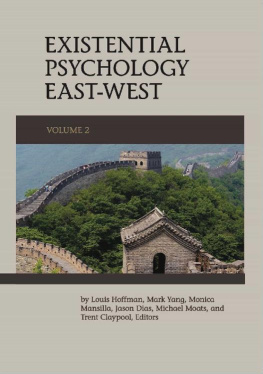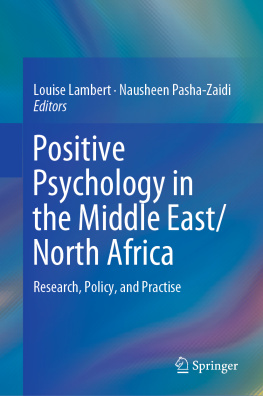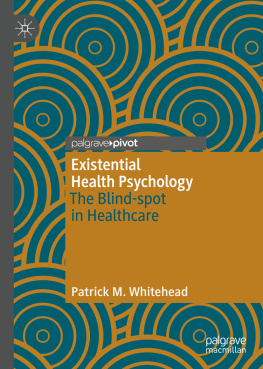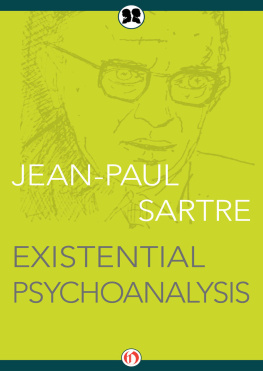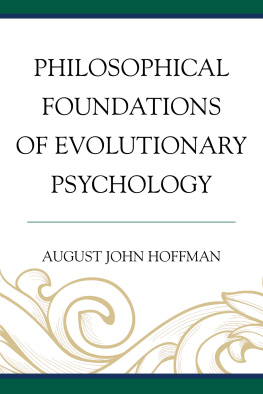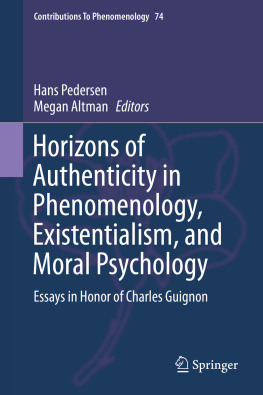Louis Hoffman - Existential Psychology East-West (Volume 2)
Here you can read online Louis Hoffman - Existential Psychology East-West (Volume 2) full text of the book (entire story) in english for free. Download pdf and epub, get meaning, cover and reviews about this ebook. year: 2019, publisher: University Professors Press, genre: Religion. Description of the work, (preface) as well as reviews are available. Best literature library LitArk.com created for fans of good reading and offers a wide selection of genres:
Romance novel
Science fiction
Adventure
Detective
Science
History
Home and family
Prose
Art
Politics
Computer
Non-fiction
Religion
Business
Children
Humor
Choose a favorite category and find really read worthwhile books. Enjoy immersion in the world of imagination, feel the emotions of the characters or learn something new for yourself, make an fascinating discovery.
- Book:Existential Psychology East-West (Volume 2)
- Author:
- Publisher:University Professors Press
- Genre:
- Year:2019
- Rating:3 / 5
- Favourites:Add to favourites
- Your mark:
- 60
- 1
- 2
- 3
- 4
- 5
Existential Psychology East-West (Volume 2): summary, description and annotation
We offer to read an annotation, description, summary or preface (depends on what the author of the book "Existential Psychology East-West (Volume 2)" wrote himself). If you haven't found the necessary information about the book — write in the comments, we will try to find it.
Existential Psychology East-West (Volume 2) — read online for free the complete book (whole text) full work
Below is the text of the book, divided by pages. System saving the place of the last page read, allows you to conveniently read the book "Existential Psychology East-West (Volume 2)" online for free, without having to search again every time where you left off. Put a bookmark, and you can go to the page where you finished reading at any time.
Font size:
Interval:
Bookmark:
Contents
Existential Psychology EastWest
Volume 2
Louis Hoffman, Mark Yang, Monica Mansilla,
Jason Dias, Michael Moats, and Trent Claypool
Editors

www.universityprofessorspress.com
Copyright
Book Copyright 2019
Existential Psychology EastWest (Volume 2)
By Louis Hoffman, Mark Yang, Monica Mansilla, Jason Dias, Michael Moats, and Trent Claypool
All rights reserved. No portion of this book may be reproduced by any process or technique without the express written consent of the publishers.
First published in 2019. University Professors Press. United States.
ebook ISBN: 978-1-939686-41-1
Print ISBN: 978-1-939686-24-4
University Professors Press
Colorado Springs, CO
www.universityprofessorspress.com
Cover Design by Laura Ross
Acknowledgments
Existential Psychology EastWest (Volume 2) has been nearly nine years in the making. We wish to thank the contributors to this volume for their persistence and patience in seeing this project to completion. We owe special gratitude to Fudan University, particularly Drs. Sun Shijin and Chen Kan. This volume began in 2012 at the Second International Conference on Existential Psychology, which was hosted by Fudan University, located in Shanghai, China. Drs. Sun Shijin and Chen Kan were instrumental in the planning of the conference as well as identifying and communicating with collaborators. We also owe special thanks to Xuefu Wang, who also helped identify and communicate with contributors to this volume.
We would like to extend special appreciation to our families. Writing takes commitment, dedication, and time, and all of these require sacrifice. Our families sacrificed, too, through giving up precious family time for us to devote to writing, editing, and communicating about the book.
Finally, we want to thank all those who have been part of the dialogues on existential psychology that have been held in Southeast Asia over the past 11 years. These friendships and conversations are the primary inspiration for this book.
Introduction from the West
Louis Hoffman, Mark Yang, Monica Mansilla, Jason Dias, Michael Moats, & Trent Claypool
The Second International Conference on Existential Psychology in Shanghai, China not only was the birthplace of this volume but an inspiring success. The conference was filled to capacity, drawing in many influential scholars from China, the United States, and other parts of the world (see Hsu, Broom, Mansilla, Phoo, Dias, Moats, Hoffman, & Yang, 2019, for an overview of the ICEP conferences).
Our intent was to build upon the success of Existential Psychology EastWest (Volume 1). In Volume 2, we followed a similar format of three parts with a few modifications. The first section of Volume 1 comprised an introduction and overview of existentialhumanistic psychology along with a case study to illustrate key aspects of the theory and practice, and the second section focused on the development of existential theory. In Volume 2, the theory and application section has been moved to the first section of the book, followed by a section on applications and case illustrations. The third section of Volume 2 continues with the myth theme of Volume 1. The addition of the application and case illustration section is significant in that it helps readers get a deeper understanding of the various ways existential psychology can be applied.
Existential Psychology EastWest (Volume 2) is being published concurrently with Existential Psychology EastWest (Volume 1 Revised & Expanded Edition). The update of Volume 1 includes five new chapters and several updated chapters, including an important update of Chapter 1, which is the overview of existentialhumanistic psychology. The two volumes are designed to fit together, so it is our hope that most readers will read this volume in conjunction with the new version of Volume 1.
In the revised version of Volume 1 and in Volume 2, we have intentionally sought to expand the focus beyond China and the United States. This includes authors from Singapore, Taiwan, Malaysia, and Ghana. We believe this expanded international content is important in recognizing the growing international perspectives on existentialhumanistic psychology.
Introducing Chinese Approaches to Existential Psychology in the West
The foundation of both volumes of Existential Psychology EastWest is exchange. In Volume 1, our intent was to provide an overview of existentialhumanistic psychology that could serve as a foundation for dialogue. However, as discussed in Chapter 4, there are always limitations in attempts to apply an approach to therapy developed in one culture in a different cultural context. While it is important to recognize this limitation, there is also much to learn from cross-cultural exchange (see Moats, Claypool, & Saxon, 2011). In these two volumes, we hoped to balance the exchange of ideas. Too often, Western psychologists focus on exporting their ideas to other cultures without recognizing the value of the ideas, practices, and scholarship from the culture with which they are engaging. We strove to intentionally avoiding this in these volumes. In Volume 2, there are also a number of chapters by individuals who have lived in more than one culture.
While the labels existential and existential psychology emerged in the West, the ideas and values they represent do not belong exclusively to the West (Hoffman, 2010). Indigenous existential psychologies from many cultures around the world can be identified that share values such as facing life directly, being honest about the human condition, valuing genuineness and authenticity, and recognizing the importance of personal and collective meaning. While there is agreement on these values, the way they are understood and applied may still vary. Dialogues across the different cultural approaches to existential psychology are vitally important for the advancement of existentialhumanistic psychology. In 2019, it is increasingly possible to recognize how various different approaches to existential psychology from around the world are influencing existentialhumanistic psychology in the West.
One of the more important Chinese existential psychologies is zhi mian therapy developed by Xuefu Wang. Zhi mian can be translated as face-to-face or to face directly (Wang, 2011). At the first ICEP, Wang expressed his hope that the idea of zhi mian would become known in the Western psychological literature. This has begun to occur through the writings of Wang (2011, 2012, 2019) as well as other scholars who have begun to incorporate the idea of zhi mian into their scholarship (Dallas, Georganda, Harisiadis, & Zymnis-Georgaolos, 2012; Hoffman, Lopez, & Moats, 2013; Rohde-Brown & Frain, 2013). The first three chapters of Volume 2 provide the most comprehensive introduction to zhi mian psychology in English to date. In Chapter 1, Wang provides an overview drawing from the story (or myth) of the iron house, which illustrates the primacy of facing life directly in zhi mian therapy. In Chapter 2, Dueck and Wei provide an in-depth examination of Lu Xun and Wang. Lu Xun was a primary influence on Wang in his development of zhi mian therapy. In Chapter 3, Mark Yang provides a more personal account of engagement with zhi mian.
Zhi mian is one of many Chinese concepts and approaches that fit well with existential psychology. Mark Yang (2017), for example, has been working to introduce the existential writings of Zhuangzi to the West. In Section 2, chapters also introduce the Chinese concepts of Sui Wu Fu Xing, sunyata, and savoring.
Future Directions
The development of existentialhumanistic psychology in Southeast Asia has expanded greatly in recent years, particularly with the development of a number of new programs through the International Institute for ExistentialHumanistic Psychology (IIEHP) and the Zhi Mian Institute for Psychotherapy. In recent years, conferences have been held in Hong Kong, Taiwan, and Malaysia, which have helped to further expand interest. As of this writing, a two-year systematic certificate course in existentialhumanistic psychology is being offered in China through IIEHP in which the majority of the instruction and group facilitation is conducted by local instructors who have found their home in existentialhumanistic psychology. In addition, preparations are being made to offer similar types of systematic training in Hong Kong, Malaysia, and Singapore. The work is indeed rippling on and becoming indigenized.
Next pageFont size:
Interval:
Bookmark:
Similar books «Existential Psychology East-West (Volume 2)»
Look at similar books to Existential Psychology East-West (Volume 2). We have selected literature similar in name and meaning in the hope of providing readers with more options to find new, interesting, not yet read works.
Discussion, reviews of the book Existential Psychology East-West (Volume 2) and just readers' own opinions. Leave your comments, write what you think about the work, its meaning or the main characters. Specify what exactly you liked and what you didn't like, and why you think so.

